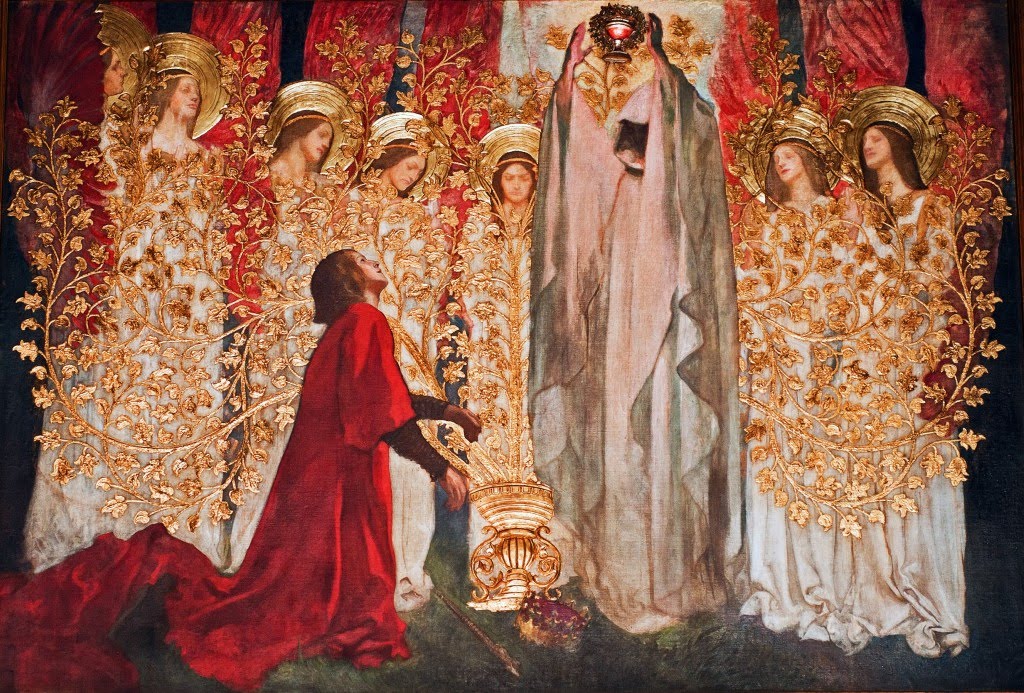A brother who had sinned was turned out of the church by the priest; Abba Bessarion got up and went with him, saying, ‘I, too, am a sinner.’
—The Sayings of the Desert Fathers, trans. Benedicta Ward
Do ye not know that they which minister about holy things live of the things of the temple? and they which wait at the altar are partakers with the altar? Even so hath the Lord ordained that they which preach the gospel should live of the gospel. But I have used none of these things: neither have I written these things, that it should be so done unto me … Verily, when I preach the gospel, I make the gospel of Christ without charge, that I abuse not my power in the gospel.
—The First Letter of Saint Paul to the Corinthians, IX.xiii-xv, xviii
✠ ✠ ✠
After a long intermission, I’d like now to conclude my series on the Anglican patrimony, the specially English spirit that the Ordinariates bring into Catholicism. Finding the root of that patrimony in precision, and moving from there to magnanimity, irony, hierarchy, republic, and largesse, I turn to the final quality on my original list, what I have chosen to call decorum.
It was difficult to come up with a name for this quality (decorum is by no means a satisfying one), because it’s rarely exhibited and still more rarely spoken about in American culture, and I don’t know that it’s much more commonly discussed in British culture. Nevertheless its flavor is quite distinctive; its peculiar blend of humility and sensitivity and tact is, to my mind, a uniquely charming and obvious expression of mutual submission among Christians.
A vulgar way of putting it would be that decorum means never pulling rank; a marginally smarter, still vague way of putting it would be that decorum means taking no advantage of the powers you possess through hierarchy. But, because decorum (as I here use the term) is so unfamiliar, it may actually be easier to approach through a negation.
For many years, I’ve been bothered by the use of the Filioque in the Creed1 at Mass. Now, to be clear, I confess and indeed insist quite fervently on it, from a doctrinal point of view—I don’t see how anyone could admit that the Son is the image of the invisible God and the express image of his person without admitting the Filioque too; and it seems like the most natural way to interpret our Lord’s saying that As the Father hath life in himself, so hath he given to the Son to have life in himself. But the manner in which the Filioque was made binding upon the Church is, I believe, deeply objectionable; the high courtesy of the Church should have forbidden it. Let me explain.
The Nicene Creed, as the name implies, originated at the First Council of Nicæa in 325, and was altered slightly at the First Council of Constantinople in 381, to give a more explicit confession of the deity of the Holy Ghost. It was further agreed, at the Council of Ephesus fifty years later, that it is unlawful for any man to bring forward, or to write, or to compose a different Faith as a rival to that established by the holy Fathers assembled with the Holy Ghost in Nicæa. This could be read simply as a proscription of heresy, but it was taken back then, and for some centuries afterwards, to include a ban on any and all rewording of the Creed as it had been inherited from Constantinople; or, at minimum, that additions to the Creed had to be approved by the whole Church, gathered in council.
The reason the Filioque was put into the Creed at all was to strengthen the orthodox doctrine of the Trinity against Arian and Semi-Arian theologies,2 which remained popular among many of the Christianized Goths who ruled formerly Roman territories like Gaul, Spain, and much of the Balkans. Its earliest attestation in the Creed probably belongs to the Council of Toledo in 589, and was likely aimed at the Visigothic ruling classes of Spain, who long remained Arian. The Popes refused the interpolation, not doctrinally but liturgically, for centuries: in 810, Leo III, who pointedly declined to be pressured even by Charlemagne, had the Creed inscribed in its traditional wording in both Greek and Latin on silver plates and posted publicly in Rome. It wasn’t until the eleventh century that the Bishops of Rome finally introduced the Filioque into their recitation and chanting of the Creed.
Now, I am a fervent believer in the Catholic doctrine of the Papacy: when Protestantism had become intellectually and spiritually untenable for me, I considered Eastern Orthodoxy for a time, but ultimately I went to Rome, not despite but because of her understanding of the Petrine office. The Orthodox appeal to councils, lacking a defined reference point for which councils are to be considered authentic, was finally unsatisfying to me. Both the inner logic of epistemic authority and the actual words of Christ to Peter seemed to me to demand a single locus of authority and unity. So I do believe the Popes had the power to insert the Filioque without summoning an ecumenical council.
However. That doesn’t make pulling rank attractive behavior, and authority in Scripture pretty much always means authority to serve and to suffer for others, authority to wash the feet of the rest; God did not exempt himself from that model of leadership. It was a breach of courtesy of the first order that the Popes added the Filioque without resorting to a council; and courtesy, reciprocal submission, taking no advantage of one’s powers, is the spirit of decorum. Decorum would not deprive its fellows even of their ego, if it could help it; to cause pain or offense to another, even for a good and necessary reason, is dismaying to the decorous mind (though, if the mind is committed to precision as well, it’s still ready to do dismaying things when it has to).
For our powers (whatever they are) were not given to us for our own benefit. They were given to us for the practice of largesse, exchange, mutual self-gift. That’s why we’re annoyed when people pull rank in whatever way—not because they’re transgressing their rights (or if they are, what they’re doing is bullying, not pulling rank), but because they’re transgressing the delicate, usually unspoken code of respect that is a narrower and lovelier thing than simple justice. It’s offensive for the same reason honesty without tact is offensive.
And what makes this quality specially English, you may ask? Well, by way of illustration, look at the royal family: legally, the Queen of England has a quite fantastic amount of legal power, of which she makes no use whatever. And why? because there would be a revolution? because no one would listen? because she lacks confidence? No; I tell you with full confidence, she doesn't exercise her power because she is an Englishwoman.
Decorum thus embraces and perfects the other qualities of the Anglican patrimony I’ve addressed: the precision which adheres only to the truth; the magnanimity and largesse that delight in giving; the hierarchical and republican sensibilities that delight in respecting; and the irony that delights in the contrast between all these ideals and the actualities of humanity, yet laughs with affection rather than scorn. All these paradoxical brilliances are caught, dimmed, and harmonized in the stained glass of the decorous mind.
Nativity window, Chester Cathedral, England
Ere by the spheares time was created, thou
Wast in his minde, who is thy Sonne, and Brother;
Whom thou conceiv’st, conceiv’d; yea thou art now
Thy Makers maker, and thy Fathers mother;
Thou’hast light in darke; and shutst in little roome,
Immensity cloystered in thy deare wombe.
—John Donne, Annunciation ll. 9-14
✠ ✠ ✠
1The Latin word Filioque literally means ‘and from the Son,’ and refers to the Catholic doctrine that the Holy Ghost proceeds from the Son as well as the Father, in distinction from the Orthodox assertion that He proceeds only from the Father. This was at first a contrast between Latin and Greek styles of theology, eventually becoming a quarrel, and finally one of the principal reasons (or pretexts) for the Great Schism, which arose in 1054 between the Patriarch Michael Cærularius and Pope Leo IX—or, more exactly, his successor Victor II. The papal excommunication of the Patriarch was delivered after Leo’s death, and was thus canonically invalid (since the cardinal who delivered it was there as a legate of Leo IX, not in his own right), whereas the Patriarch’s responding excommunication of the Pope and removal of his name from the communion diptychs (intrinsically dubious though these actions were, since there was little precedent for Constantinople to judge Rome and plenty of precedent for Rome’s claims of universal jurisdiction) would therefore have applied to Victor II, who acceded the next year.
2Arianism was the doctrine that the Son was not God, properly speaking, but the highest created being and the one through whom God the Father made everything else. Semi-Arianism was a version of this theology which stressed the resemblance between the Son and the Father, an attempt at compromising with the theological accent of the orthodox party without actually surrendering Arian belief. Although condemned at both Nicæa and Constantinople in the fourth century, Arianism long flourished in many parts of the Roman Empire, and was brought by Arian missionaries to the Germanic peoples of northern Europe, among whom it throve for centuries; it was only effectively stamped out in the seventh century.





